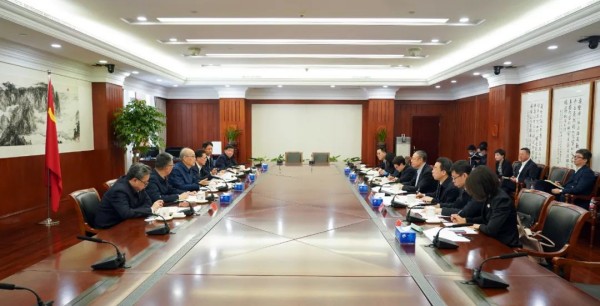Zhang Jun meets with chairman of All-China Federation of Returned Overseas Chinese
The Supreme People's Court (SPC) held a panel discussion with the All-China Federation of Returned Overseas Chinese (ACFROC) on the judicial protection of returned overseas Chinese in Beijing on April 12. Zhang Jun, president of the SPC, and Wan Lijun, chairman of the ACFROC, attended the meeting.

Zhang Jun (central left), president of the Supreme People's Court (SPC), meets with Wan Lijun, chairman of the All-China Federation of Returned Overseas Chinese, at the SPC headquarters in Beijing, April 12, 2023. [Photo/court.gov.cn]
Wan expressed his appreciation to the SPC for their work, reviewed the progress made in cooperation with the SPC in protecting the legitimate rights and interests of Chinese nationals residing abroad, returned overseas Chinese, and relatives of overseas Chinese nationals residing in China, and offered a perspective on future cooperation in improving the mediation capacity of related cases, establishing a diversified dispute resolution mechanism, and fully tapping the role of the research base in protecting the interests of returned overseas Chinese.
After hearing work reports from both sides, Zhang raised three requirements for future work in this regard: Courts nationwide should continue to safeguard the interests of returned overseas Chinese nationals, protect their interests and enhance their sense of identity and belonging to the motherland, uniting them to contribute to China's modernization.
They should fully perform their judicial function. When handling cases involving enterprises owned by returned overseas Chinese, utmost efforts are needed to ensure their survival and development in accordance with the law.
And finally, work needs to be done to innovate means to protect their rights based on past experiences. The courts should do a better job in litigation source governance and strive to resolve disputes at the grassroots level. They are also required to conduct collective research and studies for more thorough work in diversified dispute resolution and to address new issues with continuous reform and innovations.









